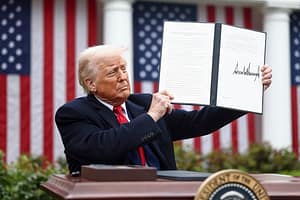The UK is at a crossroads in global trade. Stuck between its biggest export market the EU and its most influential ally, the US, the choice isn’t an either-or scenario.
It’s about leveraging both relationships to secure maximum economic advantage. Anything less would be economic malpractice.
Let’s start with the EU. Despite Brexit, the European Union remains the UK’s largest trading partner.
Love it or loathe it, geography isn’t going to change. Europe is just across the Channel, and businesses still rely heavily on access to this vast single market.
Ignoring this reality is as short-sighted as it is reckless.
But here’s the catch: the post-Brexit trade barriers are real, and they’re costly.
From financial services to agriculture, UK exporters are jumping through hoops to meet EU standards. The solution isn’t to throw hands in the air and say, “Well, Brexit happened.” It’s to push for re-entry into practical arrangements. Think customs union or other frameworks that remove friction while respecting sovereignty.
Politically sensitive? Sure. But pragmatism beats posturing every time.
On the other hand, the US relationship is a goldmine waiting to be tapped, if done right. President-elect Donald Trump’s second term brings renewed focus on transatlantic trade.
Trump’s team, including economic hawks like Stephen Moore, is making it crystal clear: align with the American model of “economic freedom,” and the UK will have a seat at the table.
That sounds enticing, but there’s small print. Higher pharmaceutical prices for the NHS and the controversial import of US agricultural products— chlorinated chicken, anyone? — are likely to be non-negotiable demands from Washington. The UK must tread carefully to strike a deal that brings economic rewards without triggering a domestic backlash.
Here’s where the opportunity lies: the UK doesn’t need to pick a side. Instead, it should double down on both. Re-energizing trade ties with Europe while pursuing a strategic agreement with the US could redefine the UK as a global trading powerhouse.
The EU brings stability and volume; the US brings innovation and influence. Together, they offer the perfect balance for long-term economic growth.
Of course, there are risks. For starters, leaning into EU alignment will provoke accusations of “betraying Brexit.” The right-wing media won’t hold back, nor will voters who see Brussels as the villain of the past decade. Similarly, giving the US too much control risks alienating the public and weakening key industries like agriculture. But the stakes are too high to let fear dictate strategy. The government must act boldly and unapologetically.
The advantages of playing both sides are hard to ignore. A stronger relationship with the EU means lower costs for exporters and streamlined trade in critical sectors like finance, manufacturing, and pharmaceuticals.
Meanwhile, a closer partnership with the US offers access to cutting-edge technology, defence collaboration, and a potentially lucrative market for British goods. The UK, positioned between these global titans, has the chance to cherry-pick the best of both worlds.
Critics will say this strategy lacks loyalty. But loyalty doesn’t pay the bills. Global trade is about hard-nosed negotiations, not sentimentality.
The US and EU know this. They play by the rules of self-interest. The UK should do the same, pushing its unique position as a bridge between the Western world’s two economic superpowers.
Keir Starmer’s government faces immense pressure to deliver. The decisions made in the coming months will shape the UK’s economic trajectory for decades. The question isn’t whether the UK can afford to work with both the EU and US. it’s whether it can afford not to. Europe and America are moving forward. The UK must keep pace.
So, let the naysayers complain. The UK doesn’t need to choose between the “socialist” European model or the “free enterprise” American system. It can have both—if it plays its cards right.
This is about strategy, not sentiment. And when done correctly, it’s about winning.






Leave a Comment